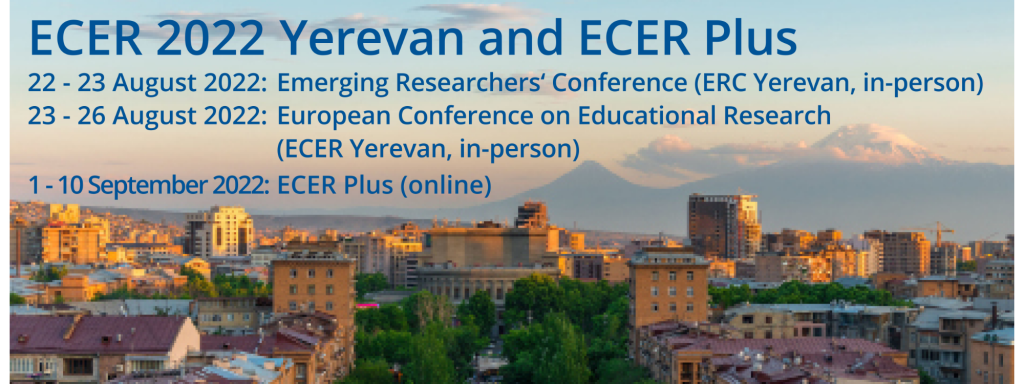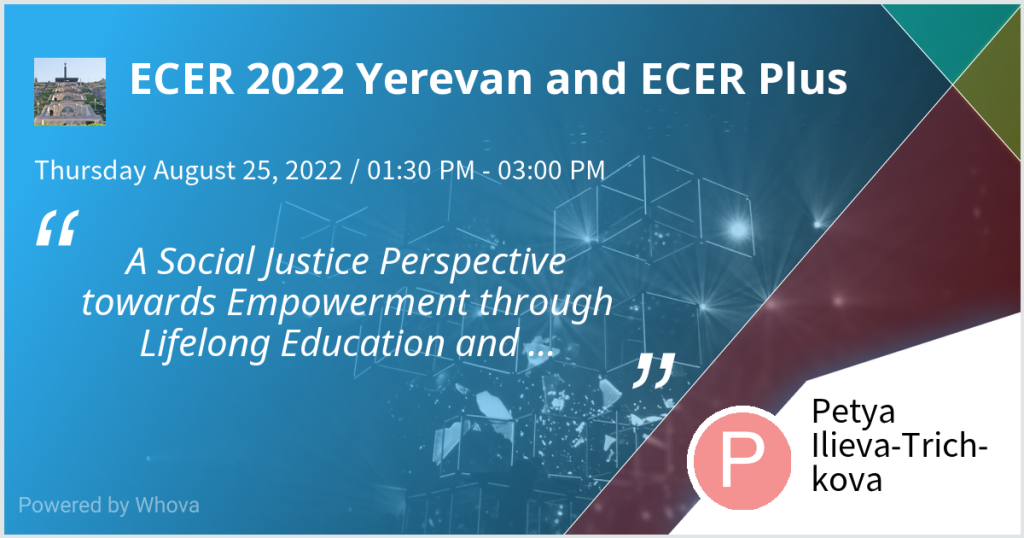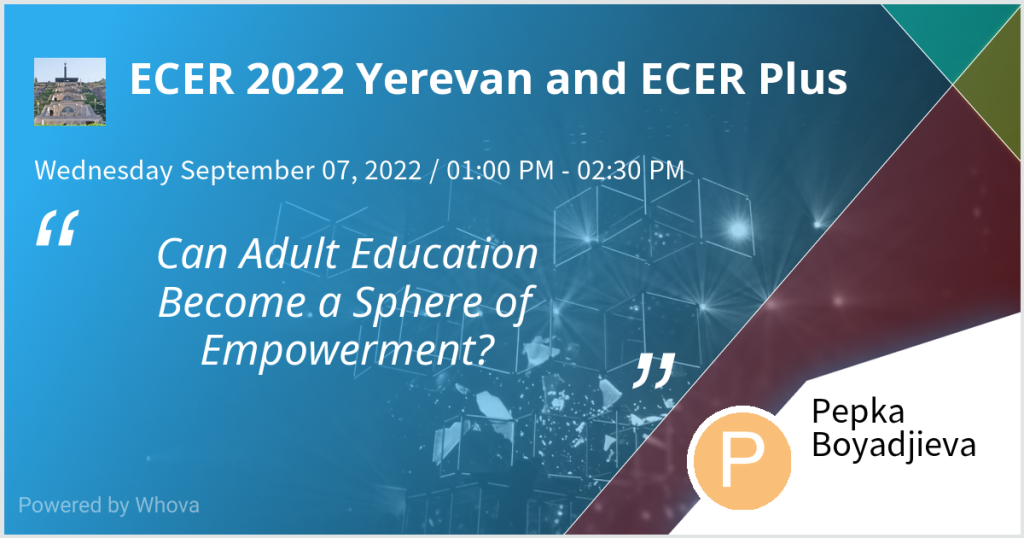
Pepka Boyadjieva and Petya Ilieva-Trichkova, members of the JustEdu project’s team presented two joint papers at the ECER 2022 Conference: “Education in a Changing World: The impact of global realities on the prospects and experiences of educational research” held between the 23rd and the 25th of August 2022 in Yerevan, Armenia and at the ECER Plus (online) conference between 1st and 10th September:
ECER 2022, Yerevan and ECER plus | EERA (eera-ecer.de)
The conference was carried out in person with nearly 800 participants from all over the world and with about 1100 participants online. The aim of the ECER conference was to create an inclusive platform for initiating, reporting, discussing and promoting high quality educational research, that not only acknowledges its own context but also to recognize wider, transnational contexts with their social, cultural and political similarities and differences.

Paper 1: A Social Justice Perspective towards Empowerment through Lifelong Education and Learning
Abstract
The present paper focuses on the importance of lifelong education and learning (we use the term ‘lifelong education and learning’ in order to grasp both institutionalized and uninstitutionalized forms of learning) for individual empowerment. Until now, the empowerment role of lifelong education and learning has been discussed only in relation to some social groups who have been defined as disadvantaged. Acknowledging that all contemporary individuals and societies can be susceptible and vulnerable (Fineman 2008), albeit to different extents, we argue that the empowerment role of lifelong education and learning becomes crucial in contemporary societies, penetrating all its other roles, and applies to all individuals and societies.
Theoretically, the paper builds on a combination of insights from the capability approach (Sen 1999, 2009) and Nancy Fraser’s (2009) theory of social justice. On this basis we propose a social justice perspective towards empowerment and its role in lifelong education and learning in order to grasp the emergence of two phenomena: empowerment as a universal need in the face of universal vulnerability; and education as a lifelong and life-wide process in contemporary societies.
Empowerment and lifelong education and learning have a common characteristic – both are lifelong processes. In the contemporary world in which all individuals and societies become susceptible and vulnerable, empowerment is not only a universal need; it is a need which is present at all stages of an individual’s life.
We regard the empowerment role of lifelong learning as having two sides: a subjective one, referring to an individual’s capability to gain control over the environment with the aim of improving their own well-being and that of society, and an objective one, reflecting the available opportunity structures. A social justice perspective towards the empowerment role of lifelong education and learning requires taking into account both the subjective and objective sides of empowerment.
The subjective side of empowerment through lifelong education and learning is related to its role in further developing the individual’s capability set and, thus, in increasing her/his potential to make high-quality choices and her/his freedom to act. Empowerment is not identical to agency enhancement, i.e., to the expansion of agency for any purpose and for the development of any capabilities – it is about developing capabilities which can ensure gaining control over one’s environment with the aim to improve individual and societal well-being.
The objective side of empowerment through lifelong education and learning refers to the available institutional structures and hierarchies (economic, political, and cultural) that influence and constitute the social sphere of lifelong education and learning, thus enabling or constraining empowerment through lifelong education and learning.
Taking into account these considerations and previous research, we think that there is a need for further research on the link between lifelong education and learning and empowerment which applies a more sophisticated understanding of empowerment and pays attention to its embeddedness in different socio-economic, political, and cultural contexts. More concretely, we will try to answer the following research questions:
(1) To what extent is participation in lifelong education and learning associated with individuals’ empowerment?
(2) Does the relationship between individuals’ participation in lifelong education and learning and their empowerment differ across different socio-economic, political, and cultural contexts?

Paper 2: Can Adult Education Become a Sphere of Empowerment?
Abstract
There has recently been growing research interest in going beyond the instrumental and economised understanding of adult and lifelong education and learning and focusing on its empowerment potential (Baily, 2011; Fleming & Finnegan, 2014; Fleming, 2016; Tett, 2018). Attempts have also been made to provide a more comprehensive view of the mission and roles adult education serves by revealing its substantial transformative power at individual and societal levels (Boyadjieva & Ilieva-Trichkova, 2021). Policy documents have been published which acknowledge the complexity of adult educational goals and the contributions made to individual and societal development, and also explicitly emphasise the emancipatory role which lifelong learning can play. Thus, according to UNESCO’s Recommendation on Adult Learning and Education of 2015 (UNESCO, 2016), the objectives of adult learning and education are: ‘to equip people with the necessary capabilities to exercise and realise their rights and take control of their destinies… to develop the capacity of individuals to think critically and to act with autonomy and a sense of responsibility’, and to reinforce their capacity not only to adapt and deal with but also to ‘shape the developments taking place in the economy and the world of work’ (art. 8 and 9). However, more research is needed in order to better conceptualise and empirically demonstrate the complexity of the empowerment potential and implementation of adult education in different socio-cultural contexts.
This paper develops a theoretical framework for conceptualising adult education’s role in individual empowerment using a capability approach perspective ((Sen, 1999; Nussbaum, 2000). It also provides empirical evidence on how adult education can contribute to individuals’ empowerment. Adult education is both a sphere of, and a factor for, empowerment. Empowerment through adult education is embedded in institutional structures and socio-cultural contexts, and has both intrinsic and instrumental value; it is neither linear nor unproblematic. Adult education’s empowerment role is revealed in expanded agency; this enables individuals and social groups to gain power over their environment. Using quantitative and qualitative data, the paper shows that participation in non-formal adult education can empower individuals, increasing their self-confidence, capacity to find employment, and to control their daily lives.